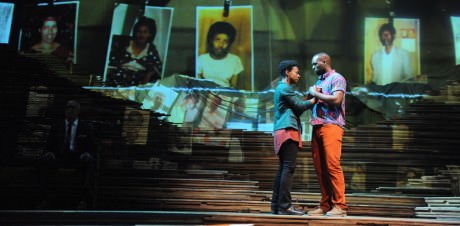Unexplored Interior (This is Rwanda: The Beginning and End of the Earth), the production launching the inaugural season of Mosaic Theater Company of DC, met Founding Artistic Director Ari Roth’s “ultimate goal of prompting reflection, discussion, uplift, and impact.”

This is my personal reflection on issues that struck me hard and deep as raised by the purposeful weight of Unexplored Interior, about the genocide and tribal cleansing that happened in the small African country of Rwanda. In this particular case my column is not written as a theater reviewer but rather from an individual who for a time headed the U.S. Office of Refugee Resettlement (ORR). My federal service in that office filtered by reactions to Unexplored Interior as written by first time playwright Jay O. Sanders and directed by Derek Goldman.
As for ORR. Well, ORR is a Department of Health and Human Services office with a vast array of little known responsibilities including resettlement of refugees and to assist them to achieve economic self-sufficiency after arrival in the United States. (Even less well-known, ORR is responsible for the care and placement of unaccompanied minor children who cross the U.S. borders and are apprehended by the Border Patrol).
So, why does any of that matter? Well, the Mosaic news release for Unexplored Interior has a quote attributed to Roth: “We got there too late. We got there with aid, after the killing. Where was the UN?”
As I opened myself up to production of Unexplored Interior, I pondered issues beyond the US and UN’s passivity to the 800,000 Rwandans murdered in 100 days. I began to brood about what happened to the 2.3 million people who fled Rwanda for safety from the slaughter to nearby countries on the African continent.
What had the United States and the UN done for them; these “huddled masses yearning to breathe free” and be safe? How many of the 2.3 million were admitted to the United States as refugees? Some on-line research seemed to indicate that perhaps 2,000 or so may have been admitted to the United States at a time when the United States regularly admitted well over 110,000 refugees each year. That number stopped me cold.
For those with an interest, here are links to ORR reports to Congress for 1994 and 1995 to give some official “big” data and narrative.
It does matter what an individual is called – economic migrant, refugee, asylum-seeker, or immigrant. The official, legal term defining a refugee comes from an international agreement: the 1951 Convention relating to the Status of Refugees. This is the key legal document in defining who is a refugee, their rights and the legal obligations of governments. According to this Convention, a refugee is someone who has fled his or her country “owing to well-founded fear of being persecuted for reasons of race, religion, nationality, membership of a particular social group or political opinion.”
From The UN African Agency.
From the UN: Refugees: Overview of forced displacement.

Unexplored Interior led me to many thoughts on my drive home about those who perished and those who left their homes in Rwanda to live in refugee camps in near-by African counties. Here are some:
Pity those who do not have a lobbyist working for them.
Pity those who do not have the interest of elected officials,
Pity those who do not use photography and social media to reach the world outside with their plight,
Pity those who do not have the persuasive powers behind them from the major U.S. Voluntary Agencies (and this) that are at the heart of the United States Refugee Resettlement program,
Pity those who became refugees after the end of Cold War when who might be helped and for what reason changed.
Pity those wishing to come to America after the events of 9/11 reduced those number of refugees admitted for resettlement.
Unexplored Interior is prescient raising issues that fit easily into today’s news headlines as well as President Obama’s recent speech at American University about comprehensive immigration reform.
My colleague John Stoltenberg will have the DCMetroTheaterArts review for you tomorrow. For this columnist, Mosaic Theater accomplished what it set out to do. It raised “explosive conversations” that stay with me still. Yup, that is what theater can do. And that is separate and apart from the artistic production values.
Unexplored Interior plays through at Mosaic Theater Company of DC performing at Atlas Performing Arts Center – 1333 H Street, NE, in Washington, DC. For tickets, call the box office at (202) 399-7993 extension 2, or purchase them online.





